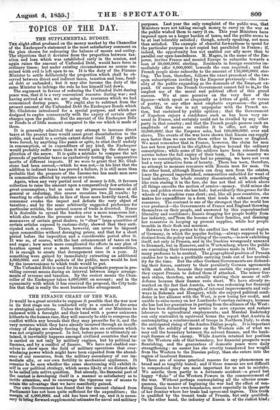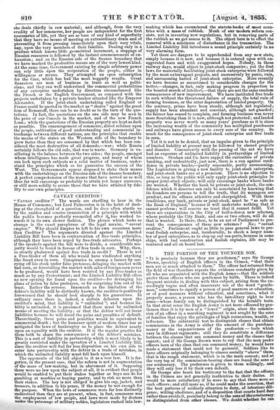THE FINANCE CHART OF THE WAR.
IT would be a great mistake to suppose it possible that the war now in its first stage can be conducted only as a contest of fire-arms or strategical operations. Unless the wisdom of our Ministers be endowed with a foresight and their hand with a power unknown hitherto to the human race, they will scarcely be able to compress the conflict within any bounds that they may prescribe for it, and the very reverses which they have already incurred through an insuffi- ciency of design are already forcing them into an extension which was not originally proposed. In fact, before peace is ultimately at- tained, it inevitably happens amongst civilized countries that war is carried on not only by military engines, but by political in- fluences, and by a conflict of finance. We have not enabled our- selves to show upon the field of military operations that over- whelming power which might have been expected from the abund- ance of our resources, from the military ascendancy of our im- mediate ally, or our own fertility in mechanical appliances. It remains to be seen whether the same shortcoming will exhibit it- self in our political strategy, which seems likely at no distant date to be called into active question. But already, the financial part of the contest is developing itself in a manner so satisfactory as to invite attention, and to encourage the vigorous use of means to retain the advantage that we have manifestly gained.
Our own Government has found that the amount claimed from Parliament has not been quite sufficient for the expenditure; the margin of 4,000,0001. and odd has been used up, and it is neces- sary to bring forward supplemental estimates for naval and military
purposes. Last year the only complaint of the public was, that Ministers were not taking enough money, to carry on the war as the public wished them to carry it on. This year Ministers have imposed upon us a larger harden of taxes, and the public seems to be at last tolerably satisfied ; though, soberly speaking, not more than satisfied. The example of cheerful forwardness to spend for the particular purpose is not copied but paralleled in France; if indeed, the opportunity has not enabled our ally more than to parallel our open-handedness. M. Magne, in the name of the Em- peror, invites France and monied Europe to subscribe towards a loan of 30,000,0001. sterling. Residents in foreign countries im- mediately offer 8,000,000/. towards the sum required ; and the French people alone subscribe to the amount of 136,000,000/. ster- ling. The loan, therefore, follows the exact precedent of the two open subscriptions invited by the Emperor previously—the liber- ality of the public expanding as the demands of the Emperor ex- pand. Of course the French Government cannot fail to make the amplest use of the moral and political effect of this grand success. We at once perceive on the very face of the figures—which speak as eloquently as letters of gold, or verses of poetry, or any other most emphatic expression—the great facts, that the war is not unpopular with the French na- tion, but sustained by public opinion ; that the Government of Napoleon enjoys a confidence such as has been very un- usual in France, and certainly could not be rivalled by any other party in that country; and that the French people possess such an amplitude of means as enables it to offer, not only the 30,000,000/. that the Emperor asks, but 100,000,000/. over and above. The events of the war have shown that Russia can supply men faster than we can raise them either in France or England. We must remember that in France, however, the claim for men has not been pressed in the slightest degree beyond the ordinary conscription ; while some of the soldiers have been released from service before the full expiry of their term. In this country we have no conscription, we have had no pressing, we have not even had a very attractive form of bounty. There has been, therefore, no attempt to measure resources with Russia man for man. On the other hand, although Russia can drag men from the estates, leave the ground impoverished, communities enfeebled for want of local industry, the whole country discontented, with something like ruin staring it in the face, she has not that oil which above all things smooths the motion of armies—money. Gold-mines she has, and golden stores she has had ; but evidently this grease for the wheels of the machine runs short ; and, like all poor countries, she makes her expenditure in a form that tends to exhaust its own resources. The contrast is one of the strongest that the world has ever produced—the Governments of France and England throwing themselves on their people, and answered by this superabundant liberality and confidence ; Russia dragging her people bodily from her industry, anefrom the bosoms of their families, and draining her resources in keeping up present supplies, while her people tremble in their flesh and murmur.
Between the two parties to the conflict lies that neutral region of Germany, in which the popular feeling,—always supposed to be distinct from the policy and feeling of the courts,—is now exhibiting itself, not only in Prussia, and in the Duchies wrongously annexed to Denmark, but in Hanover, and in Wurtemberg, where the public are reminding their Governments of promises made in 1848. Ger- many professes to be neutral. The geographical position of Prussia enables her to make a profitable carrying trade out of her neutral- ity for the time. But the other German Governments are disband- ing their forces, contrary to their peculiarly German agreements with each other, because they cannot sustain the expense ; and they expect Prussia to defend them if attacked. The minor Ger- man states, therefore, are actually waiving their means of self- defence because their finance runs short. We have already re- marked on the fact that Austria, who was redeeming her financial credit so well upon the strength of internal improvements and rail- ways in Bohemia and Hungary, while she enjoyed political confi- dence in her alliance with the West, is now losing her credit, and unable to raise money on her Lombardo-Venetian railways, because she has lost her guarantees in parting from the alliance of the West : she has been disbanding her armies to save expense and restore labourers to agricultural employments; and Marshal Radetzsky can only contradict in equivocal terms the report that Austria is contemplating a reinforcement of troops in Northern Italy, to stem the anticipated rising of the Austro-Italian people. It is important to mark the solidity of means on the Western side of what we may call the boundary between the solvent finance, and the bank- rupt finance of the enemy. While Austria retained her position on the Western side of that boundary, her financial prospects were flourishing, and the guarantees of domestic peace were daily strengthening : no sooner has she overtly transferred her weight from the Western to the Russian policy, than she enters into the region of insolvent finance.
There are of course practical reasons for any phenomenon so broad and so tangibly tested; and if these reasons are not difficult to comprehend they are most important for us not to mistake. We ascribe them partly to a fortunate accident—a grand but happy " fluke " of the Western Powers in the commencement of the war. Without perhaps contemplating all the ulterior conse- quences, the manner of beginning the war had the effect of con- fining Russia to her own boundaries, most especially in those parts of her frontier where her trade had egress and ingress. This truth is qualified by the transit trade of Prussia, but only qualified. On the other hand, the industry of Russia is of the rudest kind; she deals chiefly in raw material; and although, from the very crudity of her oommeroe, her people are independent for the first necessaries of life, yet they are so bare of any kind of superfluity that they have no means of meeting an extraordinary drain and of preventing it from pressing immediately .upon their very vitals, nay, upon the very members of their families. Dealing only in a produce which knows little geometrical increment, a stoppage of Russian resources is followed by the instant commencement of ex- haustion ; and on the Russian side of the finance boundary that we have marked the productive means are of the very lowest kind. At the same time, Government existing by simple arbitrary power can rely little upon the cooperation of the people, either in willingness or means. They attempted an open subscription for the Czar, which has had the most beggarly results. Great financiers are men of business in trade as well as politi- cians, and they can well understand the commercial probabilities of any enterprise undertaken by directors circumstanced like the French or the English Government, as compared with the projects undertaken by a private banker situated like the Emperor Alexander. If the joint-stock undertaking called England or France could be quoted in the market as " shares " against the great firm of Romanoff, there can be no doubt as to the turn of the quo- tations. In fact, the quotations on the one side may be seen in the price of our Consols in the market, and of the new French Loan; while the quotations of the Russian property are kept as dark as possible. The encouragement of commerce, direct reliance upon the people, cultivation of good understanding and commercial in- terchange between different nations, are the principles that enable the means of the states on the Western side of the boundary to grow faster than they are consumed by that which ims been con- sidered the most destructive of all demands,—war ; while Russia certainly follows the old rule, that war is waste. Germany is va- cillating in the balance between the two sides; the people, amongst whom intelligence has made great progress, and many of whom can look upon such subjects as a solid matter of business, under- stand the principles which so far guarantee the success of the West. The Governments appear disposed to stake their means with the undertakings on the Russian side of the finance boundary. A perfect comprehension of the means that have served us so well thus far will encourage us probably to attain yet larger successes, or still more solidly to secure those that we have attained by fide- lity to our own principles.



























 Previous page
Previous page